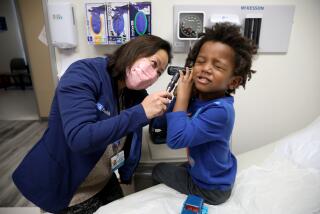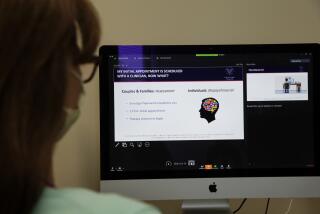Free clinic plagued by red tape
- Share via
After more than 6,600 people overwhelmed volunteers at a free mobile health clinic in Los Angeles last year, California legislators passed a law making it easier for out-of-state medical personnel to assist with future events.
But just over a week before the massive clinic returns, the state has failed to adopt regulations needed for the additional volunteers to participate. As a result, only medical personnel licensed in California will be able to treat patients and some people could be turned away. It also means Mehmet Oz of “The Dr. Oz Show” won’t be able to see patients at the clinic as planned, though he can serve as a consultant.
The clinic, which begins Oct. 20 at the Los Angeles Sports Arena, will offer free healthcare services such as mammograms and eye exams to about 5,000 patients over four days. Run by the local nonprofit group CareNow, the event will be staffed by 700 to 850 doctors, dentists, optometrists, gynecologists, cardiologists and other volunteers. The clinic will be open from 7 a.m. to 5 p.m. each day.
Organizers said this year’s clinic will add a crucial service: connecting patients to local providers for follow-up care. In the past, uninsured patients left the event with few places to go for further treatment. This year, many will leave with a scheduled appointment.
“We want to see this as a bridge to the safety net that already exists,” CareNow President Don Manelli said.
Patients also will be able to listen to presentations and receive information about nutrition, weight loss and smoking prevention.
In an effort to cut down on waiting times and crowding, patients must get a free wristband in advance. Wristbands will be distributed at the Sports Arena on Monday beginning at 1 p.m. Gates will open at 7 a.m.
The new state law, signed in September 2010 by then-Gov. Arnold Schwarzenegger, allows volunteer doctors, nurses and other licensed healthcare workers from other states to come to California to treat uninsured or underinsured patients on a short-term basis. But detailed regulations needed to establish procedures for authorizing the visiting professionals have not been finalized.
Rep. Karen Bass (D-Los Angeles) sponsored the law as state Assembly speaker and said it was approved with a sense of immediacy about helping thousands of people get treatment at such clinics. Now, fewer people will receive care because regulatory agencies have not worked quickly enough, she said.
“I am very disappointed,” she said. “I would have thought they would have realized the urgency and sped up the process.”
Los Angeles County Supervisor Mark Ridley-Thomas, who also worked on the law, calls the event a “mega free clinic” that keeps uninsured residents out of emergency rooms. But bureaucracy is getting in the way of people who need help, he said. “The agencies that were obliged to do their part failed to do so,” he said. “The ball was dropped.”
Organizers also expressed frustration at the delay on the regulations. Volunteers, including internal and family medicine doctors, nurse practitioners, pharmacists and podiatrists, are still needed, they say. Others are being asked to donate time to register patients and guide them through the clinic.
But the greatest need, Manelli said, is for dentists. “There is a huge pent-up demand for dental,” he said. Although many patients may be unaware of their medical problems, he said, “If you have a toothache you know it.”
The Medical Board of California began developing regulations as soon as the law took effect in January, but it is not expected to be finished until after the New Year, said legislative chief Jennifer Simoes. “Everyone just assumes when a law is passed that it is effective, but there are steps in the process we had to take before it could be implemented,” she said.
Several other boards, including dental, occupational therapy and vocational nursing panels, also are preparing regulations, said Russ Heimerich, spokesman for the California Department of Consumer Affairs. But they won’t be ready in time for the upcoming clinic.
The regulations are important to ensure that patients receive safe treatment, said Bonnie Castillo, director of government relations at the California Nurses Assn., which opposed the law.
“You have to have checks and balances,” she said. “You can’t have people just cross state lines and set up shop without having checked their credentials.”
More to Read
Sign up for Essential California
The most important California stories and recommendations in your inbox every morning.
You may occasionally receive promotional content from the Los Angeles Times.













![Vista, California-Apri 2, 2025-Hours after undergoing dental surgery a 9-year-old girl was found unresponsive in her home, officials are investigating what caused her death. On March 18, Silvanna Moreno was placed under anesthesia for a dental surgery at Dreamtime Dentistry, a dental facility that "strive[s] to be the premier office for sedation dentistry in Vitsa, CA. (Google Maps)](https://ca-times.brightspotcdn.com/dims4/default/07a58b2/2147483647/strip/true/crop/2016x1344+29+0/resize/840x560!/quality/75/?url=https%3A%2F%2Fcalifornia-times-brightspot.s3.amazonaws.com%2F78%2Ffd%2F9bbf9b62489fa209f9c67df2e472%2Fla-me-dreamtime-dentist-01.jpg)